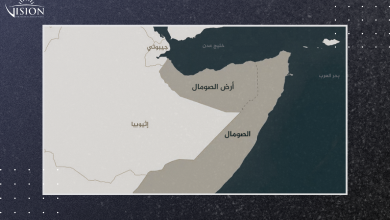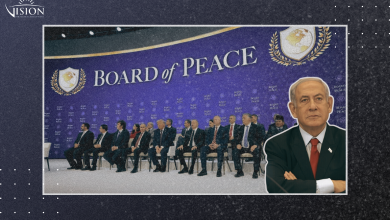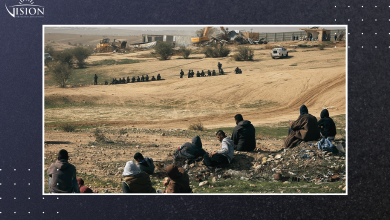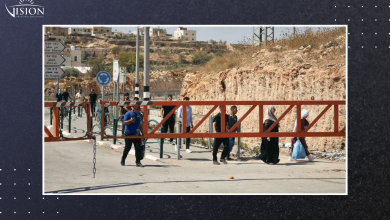How “Israel” Perceives Abbas’s Exit from Political Scene?
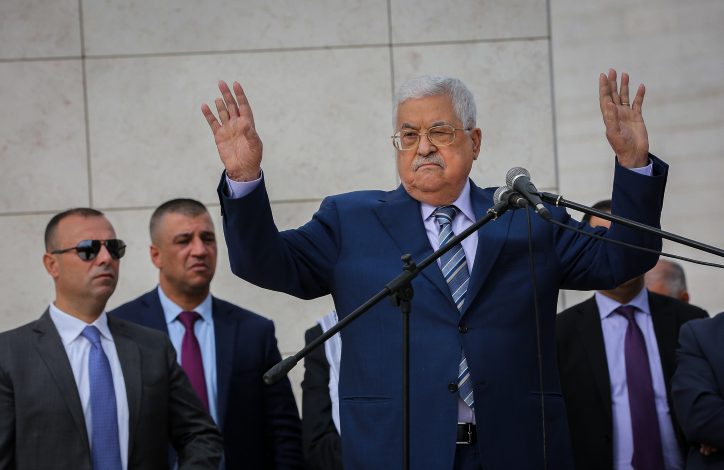
Vision center | Karim Kert
Israeli media and research centers have been attaching great significance to Palestinian President Mahmoud Abbas’s exit from political scene. Whenever there is some news about a decline in the President’s health, they rush to come up with evaluations and scenarios of the situation after his leaving the Palestinian arena and its implications on the Israeli occupation.
Over the recent several years, Israeli intellectuals and research centers have been carefully studying the matter; especially that the successor to Abbas as the President of the Palestinian Authority has become an issue. For instance, Begin-Sadat Center for Strategic Studies held a conference, in 2016, entitled “the Day after Abbas: Possible Scenarios and the Strategic Significances for Israel”.
Immediately after the latest rumors on Abbas’s death, Israeli media started discussing and analyzing the news as well as anticipating potential following scenarios. In this regard, Udi Dekel, Senior Researcher at the “Israeli” Institute for National Security Studies, issued an assessment of the situation following the death of the Palestinian President entitled “The Day after Abbas: Possible Scenarios and the Strategic Significances for Israel” which is built on a previous paper of researcher Michael Milstein: “The Day After” Abu Mazen is Already Here”, published by the center on December 15, 2020.
Challenges:
Milstein commences his work by reviewing the crises prevailing at the Palestinian arena. He opines that Palestinians have failed to achieve any of their strategic goals; most prominently: the establishment of the Palestinian State and putting an end to internal division amid a situation where Arabs are turning their back on Palestinians for normalization with “Israel”, in addition to the lack of Palestinian leadership’s real collective vision to deal with the ongoing dilemmas.
The death of Mahmoud Abbas amid this sophisticated situation will deepen the Palestinian crises. In this regard, Dekel argues that Abbas’s leaving the political arena because of death or any other reason will lead to a serious conflict at the Palestinian arena because he holds three senior leadership positions: President of the Palestinian Authority (PA), Chairman of the Palestinian Liberation Organization (PLO), and Chairman of Fatah amid the absence of any potential successor to fill in these critical positions over which many PA and Fatah figures have been competing.
Israel has not been isolated from the consequences of the events on the Palestinian arena, especially in terms of the probable change of the Palestinian political system. Milstein perceives that there is a kind of dichotomy in dealing with Abu Mazen whereby he is taken as a partner for peace and at the same time as an enemy. This complexity stems from the fact that he adheres to the political process and stood against the armed struggle, but on the other hand, he did not take national historic decisions that involve compromise on the core issues of the conflict, especially refugees and Jerusalem. Abu Mazen therefore became both an asset and a burden for Israel, as well as the Palestinians, which makes it significant to discuss the challenges and opportunities that follow his death, according to Milstein.
The Israeli researcher clarifies that among the many strategic challenges confronting Israel at the mean time are preparations for “the day after” Abu Mazen. Which he believes not a Palestinian issue only, but an issue that is expected to directly affect Israel’s strategic standing. This is because Abu Mazen’s departure from the arena will likely leave the Palestinian system suspended in uncertainty: without a clear mechanism or procedure for the transfer of power, without a designated successor, with the possibility of a power struggle over claims to the throne within the ranks of Fatah and a split between the powers of the government currently held by Abu Mazen: Palestinian Authority, PLO, and Fatah.
However, according to Dekel, the real competition will be over the leadership of the PA which possesses power and money compared to the PLO which has waived its standing for the PA and accordingly struggle over the PA leadership will be seriously practiced among Fatah leaders.
Moreover, there is an opportunity to deepen the internal rift between the Gaza Strip and the West Bank, and Hamas’s seizure of opportunities to consolidate its power in the Palestinian system. For Hamas, the possibility of a disturbance in the Palestinian arena after Abbas constitutes a historic opportunity to accomplish its strategic goals including joining and later on having control over the PLO, which allows Hamas to get into the PA and its variant institutions that strengthens its power and taking over Palestinian leadership as a replacement of Fatah.
Based on such challenges and scenarios, Dekel sums up the basic Israeli interests in the Palestinian arena, in general, and in the West Bank, in particular, in five points:
- Stability and security calm
- A responsible, functioning PA; one address for defining the rules of the game
- Economic improvements – a better infrastructure and quality of life for the Palestinian population, as a stabilizing factor
- Limited negative influence of the Gaza Strip, and other negative external influences
- Strengthening of parties that recognize Israel and are oriented toward a political settlement.
In addition to the above concerns, Milstein came up with a number of key scenarios of Abu Mazen’s departure: unification of forces of all those claiming Abu Mazen’s legacy in order to stabilize Fatah’s rule, at least for an interim period until a dominant leader emerges from the ruling group; development of violent clashes between rival camps in Fatah; the possibility that those struggles will be difficult and prolonged and will undermine Palestinian rule, creating anarchy and “cantons” in the West Bank, controlled by local leaderships or armed militias; or an immediate appeal by the Palestinians after Abu Mazen’s departure for the realization of an actual, far-reaching reconciliation, a move that will be accompanied by general elections and Hamas’s integration into the Palestinian leadership and government institutions.
While Milstein’s scenarios after Abbas’s leave are focusing on the Palestinian arena, Dekel believes that the repercussions of the Abbas’s departure on Israeli interests have three basic possible situations for the Palestinian Authority:
- A functioning and cooperative PA – similar to the current situation, in which the PA is a functioning governing element providing public services, providing a responsible and official political address, and cooperating with Israel on security and other matters.
- A hostile PA – a situation in which the PA is still functioning as the recognized and responsible Palestinian government but is hostile to Israel and refusing to cooperate with it.
- A failing PA – a situation in which the PA loses its grip, its mechanisms cease to function, and it loses its monopoly on force and is unable to function as a central government.
How would Israel face the departure of Abbas?
In fact, none of the researchers has recommended a certain choice of the above mentioned scenarios. However, Dekel defines a number of variables regarding the implications of Abbas’ departure that to a large extent will determine how the Palestinian arena will look on “the day after.” These variables include calls on the Israeli government to fulfill its role in directing these points towards its interest; the most important variables encompass the following:
- Leadership legitimacy – the replacement or replacements of Abbas in the PA leadership and its senior institutions will need internal Palestinian legitimacy, as well as legitimacy on the part of Israel and the Arab and international system.
- Internal acceptance of the succession – government change can take place in several ways: through internal consensus in Fatah, consensus in the PLO, national consensus (all Palestinian factions), by force, general elections (in the West Bank and Gaza, or only in the West Bank). In order to achieve broad legitimacy, the next leadership must take office on the basis of internal acceptance for the manner of the change. The absence of such consensus, or only partial consensus (without some factions, elections only in the West Bank), could undermine internal stability and remove any internal or external legitimacy.
- Governability and government stability – the ability to govern and provide services, plus security stability, is a central variable of the “day after” situation.
- Economic situation and quality of life for the civilian population – these factors will to a large extent determine the effectiveness of the next government and its legitimacy.
- Involvement of the younger generation – a response to demands and expectations by younger Palestinians regarding their involvement in the political system, which is perceived as aging and corrupt and not representative of the youth, will affect the character of the next leadership and government.
- External involvement – external legitimacy, expressed inter alia by political and economic support that shows trust in the new leadership, will strengthen and stabilize the system. On the other hand, the way the leadership responds to external subversion by other players on the scene (such as Iran and Hezbollah) will affect its stability and image.
- Israeli policy – Israel can have significant influence on stability in the Palestinian arena on the day after. Assuming that the new leadership is not clearly and actively hostile to Israel, the more Israel chooses a policy that includes recognition of the leadership, support, and assistance in achieving its objectives, improvement of living conditions and the economic situation for the Palestinian population, and avoidance of underhanded opportunism, the more it can contribute to the stability and strength of the new government.
- Internal Palestinian reconciliation/consensus – a vital variable in terms of strengthening and stabilizing the next Palestinian leadership is the achievement of internal reconciliation and the progress of arrangements to restore PA government to the Gaza Strip. This is true even if it is only partial in the early stages, and without making the military arm full subordinate to the PA.
While these points constitute key recommendations by Dekel to the Israeli government to expect and deal with various variables, Milstein addresses his remarks directly to the Israeli government in order to avoid the worst scenarios following these significant warnings:
- Israel must ensure the stability of the public and economic realms in the West Bank that has enabled the relative calm in the region for more than a decade.
- Israel must be carefully aware of the risks regarding any involvement in the internal Palestinian arena and interference in nominating a successor to Abu Mazen, however, Israel has to maintain the stabilization of the Palestinian system, mainly through closely monitoring developments in the Palestinian system.
- Israel must not shy away from cutting off elements that pose a serious threat, for example, an extremist takeover of the West Bank, first and foremost by Hamas.
- It is important for Israel to coordinate its actions with the key forces in the region that show interest and involvement in “the day after” issue, including Egypt, Jordan, and the Gulf states.
- Israel has to cooperate with Biden administration to maintain stability in the Palestinian arena especially that Palestinians and Abbas look at the US administration with positivity and look forward to a more fruitful role of the US administration in the struggle.
Conclusion
Milstein concludes his research by claiming that the future will of course depend on the decisions that the Palestinians must made. Will the leaders of the Palestinian Authority and Fatah prefer to unite, rather than launch a violent struggle for power? Will the leader or leaders understand that that an agenda of confrontation with Israel likely means a short tenure, and their survival requires a close connection to Israel? And perhaps a young generation will rise to power – a generation free of the rhetoric of the past that will prioritize the goal of a state “here and now,” even if modest in size and status, over the continued adherence to a fading and receding vision.
Milstein asserts that the answers to these questions will determine the standing of Israel, while concluding his paper by a vague statement: “If so, this will also obligate Israel to take a historic national decision on the question of the separation between the two peoples;” apparently he is hinting at the idea of one-state solution to the struggle for his belief that the two-state solution has become part of history.
These two papers addressed a fundamental issue which is maintaining the stability in the West Bank; which is meant to lead to the stability of the security of “Israel” and its settlements with keenness on preventing the West Bank’s turning into a confrontation area such as the case in the Gaza Strip. Ironically, this does not mean ending the occupation of the West Bank and the removal of settlements.
Therefore, it can be claimed that these two papers have demonstrated that Israel has been satisfied with the performance and the phase of Abbas because it guaranteed the maintenance of the status quo which means cooperation between the PA and the Israeli occupation particularly in security issues.
Besides, it is obviously understood from these two papers that “Israel” is concerned about the sequences of the failure of the security system in the West Bank after the departure of the Palestinian President either due to power struggle by the PA leaders or because of taking control of the West Bank by opponent factions.
So, the Israeli occupation is greatly interested in the stability of the PA’s condition in the West Bank because of its role in maintaining the stability of the political system in the Palestinian arena which mainly depends on the continuation of its security and political coordination with Israeli occupation authorities.
[1]Researcher at Yabous Foundation for Consultation and Strategic Studies and specialist in Israeli Affairs.


